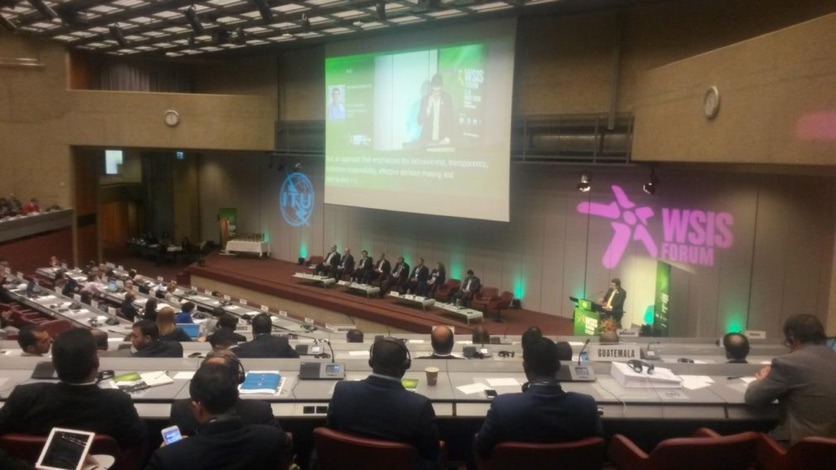Today Raúl Echeberría, our Vice President for Global Engagement, delivered the following remarks as part of the Opening Session of the WSIS Forum 2016 in Geneva.
Mr. Chairman, Honorable Ministers, Excellencies, distinguished delegates, ladies, and gentlemen, on behalf of the Internet Society, working globally through 80,000 members and 115 volunteer Chapters in 92 countries to ensure that the Internet is Everywhere, thank you for the opportunity to speak to you today.
The Internet Society was founded by the Internet’s pioneers, and evolved from a belief that ‘a society would emerge from the idea that is the Internet.‘ These pioneers saw connectivity as an intrinsic part of the future, and like most pioneers, they were driven by curiosity and to push boundaries.
These pioneers formed a network of experts that began to expand around the globe. They connected more and more physical networks, and more and more people together over time. They formed a collective community that trained each other, built more networks, and connected even more people. Their history is a history of collaborative pioneering, pushed forward by a community that saw challenges as an opportunity for innovation, and where the goal of connectivity was equally its greatest tool for its success. In those days, the Internet could still be mapped by pen and paper, and the benefits of each new connection with all of its knowledge, creativity and ambition, was clearly visible to the community as a whole. For those participating, the benefits were clear: connectivity is more than moving a packet from point A to point B – it is a tool to empower and enable those who use it.
That collaborative spirit is alive today. And, following the WSIS +10 Review, and the new Agenda for Sustainable Development, it is this spirit of empowerment and what the Internet can enable that we call upon the Global community to keep close to heart. Connectivity adds value to the whole, but connectivity alone is not the goal – it is a means to other ends. This is why the Internet Society’s contribution to the Sustainable Development Summit emphasized the enabling capacity of the Internet as a tool to drive and empower the Sustainable Development Agenda as a whole.
To fully realize the Internet’s potential we also need to build human capacity to enable people to shift from being users to creators, and for creators to become innovators. Companies, governments, or NGOs alone will never achieve sustainable development – it can only be done through a collective effort – by building communities – that empower people and by giving them access to information, markets, healthcare, and opportunities to make their needs and ambitions heard.
As we engage with communities across the world to promote and improve the open standards and infrastructure that underpin the spread of the Internet, we recognize that the success of the Internet is inherently linked to building the capacity of those it connects. Part of this capacity building is intrinsically linked to the Internet itself, of its open access and global reach, but equally in the ability of its users to use and build on the open platform that is the Internet.
Multistakeholder approaches are the way forward…
We are all different, but we share a collaborative desire to exchange information, and a belief that the WSIS Forum can support our common goals. This Forum – the first Forum after the Sustainable Development Conference – is uniquely important. We have an opportunity to share our different needs and solutions, our lessons learnt, and to put our minds together to build and shape an Information Society we all can relate to and participate in – one that can help promote sustainable development for the benefit of all. To do this – we must include all the stakeholders who use, innovate and create on the Internet. We must strengthen the capacity in countries that need it, we must hear the voices of the youth, and we must bridge the gender gap in shaping technology for all.
As we take new steps to realize the global Information Society and to realize the vision behind the sustainable development goals, we must also build on our experiences of the past ten years, and strengthen the multi-stakeholder approach that has brought us this far. We heard this message in New York. The message that we must increase our collective efforts to address the challenges ahead, and for the future Internet to be shaped by a community of stakeholders – not by borders. If we are to harness the Internet’s full potential to support our efforts for sustainable development, we must ensure that its governance reflects its global nature by being open, distributed, interconnected and transnational. The multistakeholder approach is more than a possible alternative – it is the Internet’s DNA.
The call for continued strengthening of the multi-stakeholder approach has been echoed and affirmed across conferences, by governments, and by the people who use it. We heard it during the WSIS +10 Review and we saw the mandate of the Internet Governance Forum (IGF) extended. We see it in the preparations for the OECD Ministerial on the Digital Economy this June. And, most recently, we heard it at the G7 meeting in Japan last week: the multistakeholder approach is the way forward for a sustainable Internet – from development to security – it takes a collective approach.
As a community we must not just talk about what we can do. We need to take action. When we talk about strengthening the multi-stakeholder approach, we are not talking about a new super regime, or a single model that fits all. We are talking about an approach that emphasizes core attributes of inclusiveness, transparency, collective responsibility, effective decision making, and a distributed and interoperable governance system. Attributes that all entities, whether private or public, need to adopt to ensure effective governance of the Internet.
We call on all stakeholders to accept the responsibility we share in ensuring that the Internet continues to be a force for human development and empowerment. The Internet Society and our chapters, present in all regions of the world, have worked to promote the Internet Everywhere since our inception. We know what it takes, and we know that it requires the input of all to enable the Internet’s full potential.
For more background, we encourage you to read:
Image credit: Olivier Crépin-Leblond on Twitter

